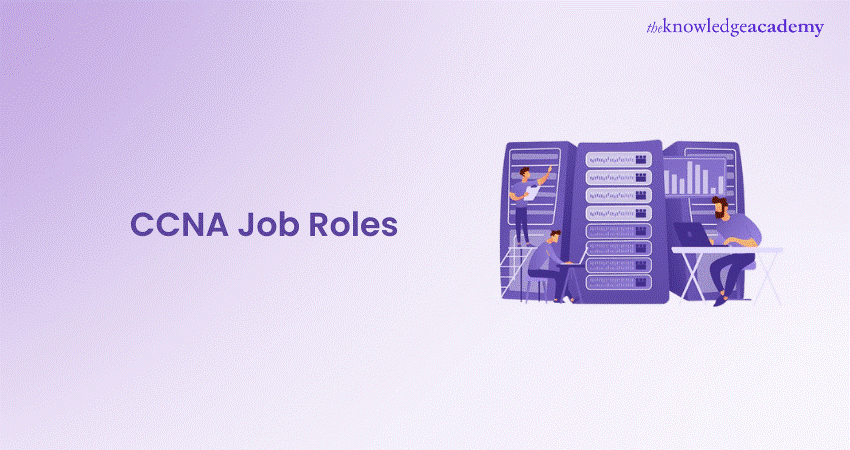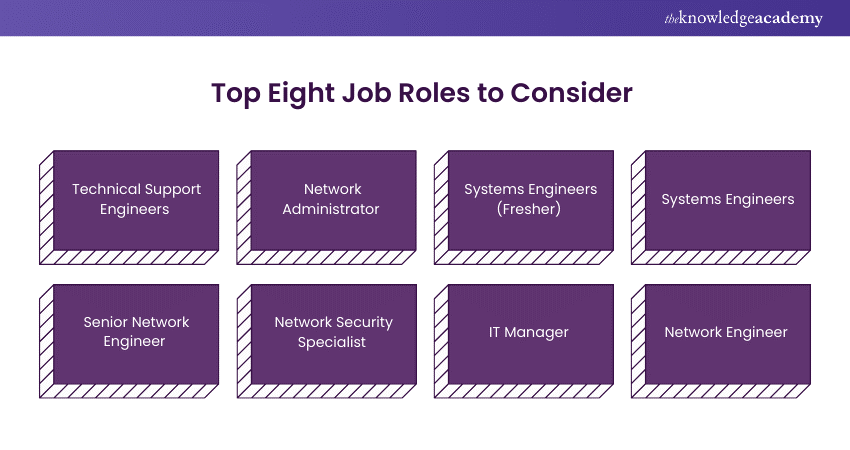We may not have the course you’re looking for. If you enquire or give us a call on +44 1344 203 999 and speak to our training experts, we may still be able to help with your training requirements.
We ensure quality, budget-alignment, and timely delivery by our expert instructors.

Are you looking to build a successful career in networking and IT? A CCNA Certification serves as a promising gateway to many rewarding career paths within the IT industry. Whether you're starting your journey or aiming to advance your career, understanding the top CCNA Job Roles is crucial.
Imagine having a clear path toward a successful and fulfilling career, with insights into the most sought-after roles and the skills needed for each. This blog will help you make informed decisions and find your niche in the competitive IT landscape. For further guidance on career progression, refer to the CCNP Career Path Guide as you explore what is CCNA and the top positions available to CCNA-certified professionals. Dive into this blog on CCNA Job Roles to explore what is CCNA and the top positions available to CCNA-certified professionals.
Table of Contents
1) Top Eight Job Roles to Consider
a) Technical Support Engineers
b) Network Administrator
c) Systems Engineers (Fresher)
d) Systems Engineers
e) Senior Network Engineer
f) Network Security Specialist
g) IT Manager
h) Network Engineer
2) Conclusion
Top Eight Job Roles to Consider
Listed below are the top eight CCNA Job Roles to consider:

1) Technical Support Engineers
Technical Support Engineers are the real heroes of any organisation, providing essential troubleshooting and problem-solving expertise. They assist with network issues, ensuring minimal downtime and maintaining smooth operations.
A CCNA Certification equips you with the skills needed to diagnose and resolve network problems efficiently, making you a valuable asset in this role. Understanding the validity of the CCNA Certification is also important to ensure you stay up-to-date with industry standards.
2) Network Administrator
As a Network Administrator, you'll manage and maintain an organisation's computer networks. This role involves configuring network hardware, ensuring network security, and optimising network performance. With a CCNA Certification, you’ll have the foundational knowledge to oversee network infrastructure, implement upgrades, and ensure reliable connectivity.
3) Systems Engineers (Fresher)
For freshers, starting as a Systems Engineer can be a rewarding entry point into the IT field. This role involves designing, implementing, and managing computer systems. A CCNA Certification provides a strong foundation in networking principles, making you well-prepared to tackle the complexities of system integration and support.
Gain in-depth knowledge about network and security fundamentals with our CCNA Meraki Training – register today!
4) Systems Engineers
Experienced Systems Engineers take on more advanced responsibilities, including the design and deployment of large-scale systems. They ensure these systems operate efficiently and securely. With a CCNA certification, you’ll have the necessary skills to understand and manage network components, contributing to the overall success of IT projects.
5) Senior Network Engineer
Senior Network Engineers lead the design, implementation, and management of complex network solutions. They play a main role in strategic planning and troubleshooting. A CCNA Certification provides the technical expertise required to handle advanced networking tasks and lead projects, positioning you for senior roles within the IT department.
Learn the essentials of Interconnecting Cisco Networking Devices with our Interconnecting Cisco Networking Devices Part 1 – sign up now!
6) Network Security Specialist
Network Security Specialists focus on protecting an organisation's network from security threats. This role involves implementing security measures, monitoring for vulnerabilities, and responding to incidents. A CCNA certification, especially when paired with a specialisation in security, gives you the skills to safeguard critical network infrastructure.
7) IT Manager
IT Managers oversee an organisation’s IT operations, ensuring all systems run smoothly and efficiently. This role requires a deep understanding of various IT disciplines, including networking. With a CCNA Certification, you’ll have the technical insight to make informed decisions, manage IT projects, and lead your team effectively.
Master the skills to design, configure, and troubleshoot network topologies with our Cisco Packet Tracer Course – register now!
8) Network Engineer
Network Engineers design, implement, and maintain network solutions for organisations. They ensure reliable and secure network operations. A CCNA Certification equips you with the foundational skills to configure and troubleshoot network devices, making you proficient in managing network infrastructure and supporting business objectives.
Conclusion
Embarking on a career with a CCNA Certification opens doors to plenty of exciting job roles in the IT field. Each position offers unique challenges and opportunities, allowing you to grow and advance your career. Whether you’re starting as a fresher or aiming for a senior position, the skills and knowledge gained from a CCNA Certification will be invaluable. Embrace the journey, keep learning, and remember that every step forward, no matter how trivial, brings you closer to your career goals.
Secure your future in the IT industry with our CCNA Training today!
Frequently Asked Questions
Is CCNA in Demand?

The CCNA Certification is highly sought after and is internationally recognised for validating essential knowledge and skills in networking dynamics.
What is the Goal of CCNA?

The goal of CCNA is to equip individuals with the foundational skills and knowledge necessary for network administration and engineering. It covers essential networking concepts, including IP addressing, routing, switching, and security, preparing candidates for entry-level roles in the IT and networking industry.
What are the Other Resources and Offers provided by The Knowledge Academy?

The Knowledge Academy takes global learning to new heights, offering over 3,000 online courses across 490+ locations in 190+ countries. This expansive reach ensures accessibility and convenience for learners worldwide.
Alongside our diverse Online Course Catalogue, encompassing 19 major categories, we go the extra mile by providing a plethora of free educational Online Resources like News updates, Blogs, videos, webinars, and interview questions. Tailoring learning experiences further, professionals can maximise value with customisable Course Bundles of TKA.
What is The Knowledge Pass, and How Does it Work?

The Knowledge Academy’s Knowledge Pass, a prepaid voucher, adds another layer of flexibility, allowing course bookings over a 12-month period. Join us on a journey where education knows no bounds.
What are the Related Courses and Blogs Provided by The Knowledge Academy?

The Knowledge Academy offers various IT Infrastructure & Networking Courses, including GNS3 Training and Practitioner Course, Cisco Packet Tracer Course and the CCNP Collaboration Training. These courses cater to different skill levels, providing comprehensive insights into Importance of CCNA.
Our IT Infrastructure & Networking Blogs cover a range of topics related to IT infrastructure, offering valuable resources, best practices, and industry insights. Whether you are a beginner or looking to advance your IT and Networking skills, The Knowledge Academy's diverse courses and informative blogs have got you covered.
Upcoming IT Infrastructure & Networking Resources Batches & Dates
Date
 CCNA Certification
CCNA Certification
Mon 12th May 2025
Mon 14th Jul 2025
Mon 8th Sep 2025
Mon 10th Nov 2025






 Top Rated Course
Top Rated Course



 If you wish to make any changes to your course, please
If you wish to make any changes to your course, please


